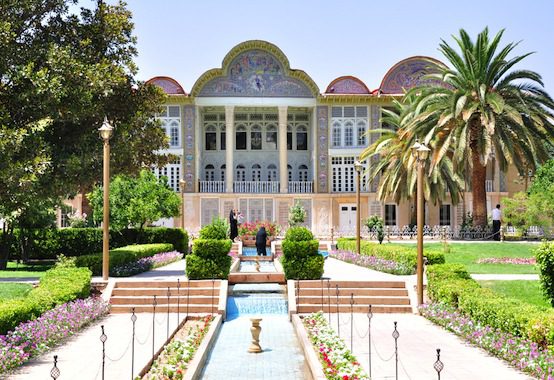The Coming Love Affair With Iran

Things are moving so rapidly on the Iran diplomacy front that it’s difficult to keep track. But the last week, the UN speeches, Iranian President Rouhani’s generally well-received “charm offensive,” the anticipation of a lunchtime handshake, the hawks’ relief when it didn’t happen, and then the phone call heard around the world makes one think the glaciers of Mideast diplomacy could break up with surprising rapidity.
Structures seemingly solid and impervious to change can collapse quickly when the time is right: the Maginot Line, the Berlin Wall. Who believed in 1987 that Eastern Europe would be more or less free of Soviet dominance within three years, or that the Soviet Union itself would collapse? Not, to my memory, a single high-ranking diplomat, businessman, or university professor.
So imagine: the nuclear diplomacy track gets going, and Iran makes it clear that it will trade transparency and inspections to ensure non-weaponization. Obama does what he can strip away the sanctions, encouraged by Europe, which is eager to trade and invest in Iran. And suddenly Americans realize there is this large, sophisticated Muslim country, with a large middle class and a huge appetite for American culture and business. It is not a U.S.-style democracy, far from it—but no country in the Middle East is. At worst it is in third place. Compared to the state of political freedom in China in 1971, contemporary Iran is a New England town meeting.
Recall: in 1971, American elites fell in love with China. The “China Lobby”—that large complex of anti-communist Chinese and Americans with personal and professional ties to China who felt jilted by the Revolution and which had prevented any rapprochement until then—proved to be a proverbial “paper tiger” once President Nixon decided to reach beyond it. American elites were suddenly enthralled by ping pong and pandas. New York Times columnist James Reston had an appendectomy with no anesthetic beyond acupuncture, and it worked out wonderfully—and became the source of hundreds of respectful news stories about Chinese medicine. For years, China was the new flavor on the block. Growing ties with China were the backdrop to everything: America could be humiliated in Vietnam and the world hardly noticed.
Iran, of course, is a smaller deal—smaller in its size, cultural and military weight, and aspirations. But it is a Muslim country that is highly educated (which seems to be the nexus of the problem for Washington’s hawks) and is moving seriously towards democracy. It is not Saudi Arabia, whose ruling princes have all the corruptions and weaknesses associated with vast unearned wealth. Iran has all the traits of a modernizing state—mass literacy, mobilized working classes. It has managed to hold its head high throughout almost 30 years of confrontation with Washington. It promises a vast market for American businesses to help rebuild its infrastructure. My guess is that many Americans will fall in love with the place—or at least with the combination of exoticism and profits that detente with Iran promises. Yes, there will be blind and naive aspects to the love—when is there not?—but it will unleash powerful forces that governments cannot control.
So who loses? Obviously we aren’t talking about a reversal of alliances. Israel will remain one of the cornerstones of American Middle East policy. But note: “one of.” Israel has grown accustomed to a weirdly disproportionate role in Washington, as the one country to which America looks for interpretation and guidelines to action in the Mideast. Normalcy with Iran would almost certainly muddle that. Daniel Levy describes the Israeli reaction to the Obama-Rouhani dance thus:
The Israeli premier simply does not want an Islamic Republic of Iran that is a relatively independent and powerful actor. Israel has gotten used to a degree of regional hegemony and freedom of action—notably military action—that is almost unparalleled globally, especially for what is, after all, a rather small power. Israelis are understandably reluctant to give up any of that.
Israel’s leadership seeks to maintain the convenient reality of a neighboring region populated by only two types of regimes. The first type is regimes with a degree of dependence on the United States, which necessitates severe limitations on challenging Israel (including diplomatically). The second type is regimes that are considered beyond the pale by the United States and as many other global actors as possible, and therefore unable to do serious damage to Israeli interests.
An Iran brought into the fold would fit into neither category. It would be a self-reliant and independent power, not a military threat but certainly a state wielding considerable cultural and economic “soft power.” A procession of American tourists into Teheran, followed shortly by students and businessmen, would change American perspectives on the region. Israel’s ability to act as America’s ears and eyes and ultimate interpreter of regional events would almost certainly be diminished, perhaps radically.
I expect Netanyahu and the Israel lobby to use every diplomatic trick they can muster to thwart an American-Iranian rapprochement before it happens. They may succeed; that would be the cynics’ view. As the chattering classes are saying in Teheran right now, the Israel lobby will “not allow it.” But Israel, even with its well-entrenched lobby, doesn’t hold all the cards, and we may find out it holds fewer than we think.
Comments